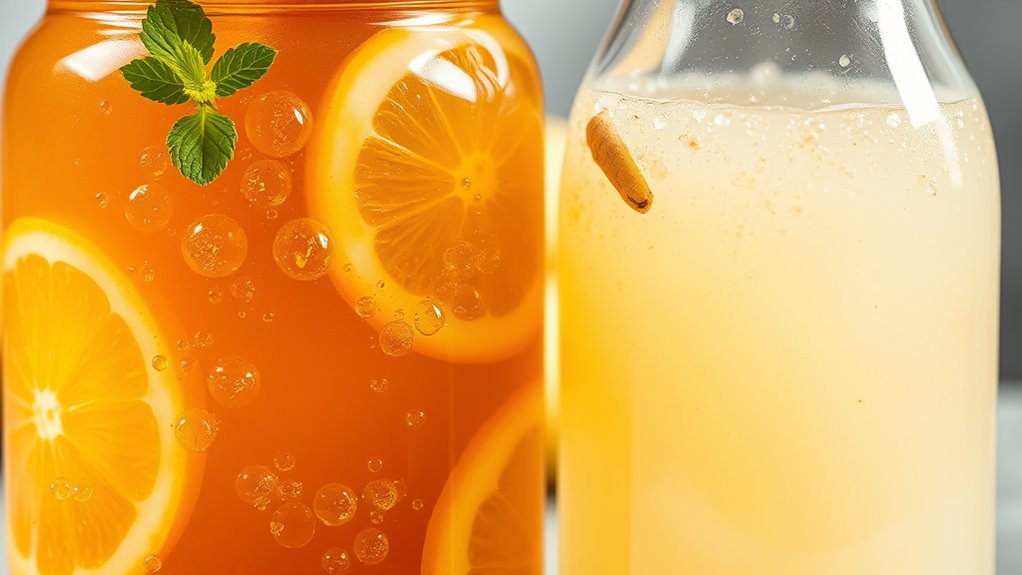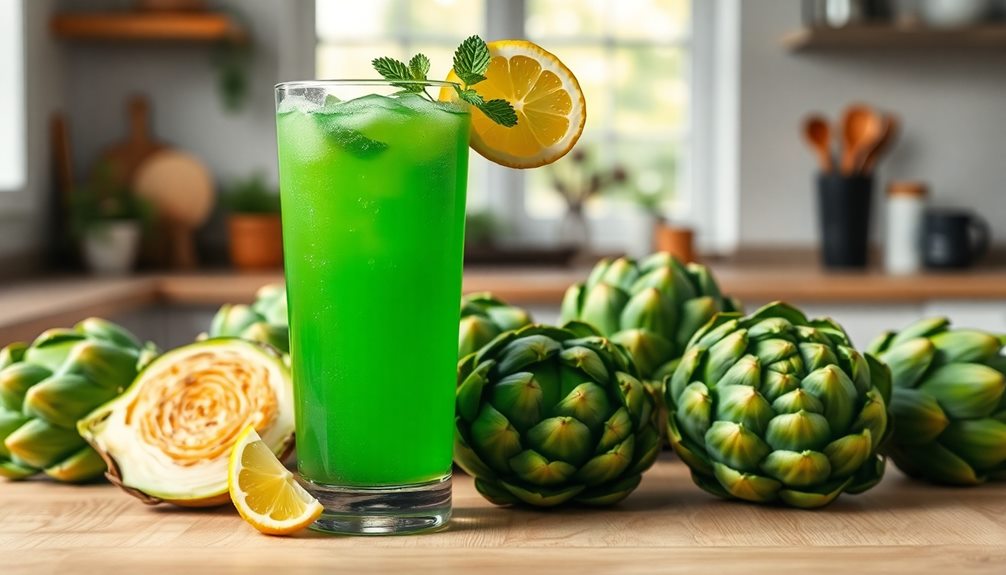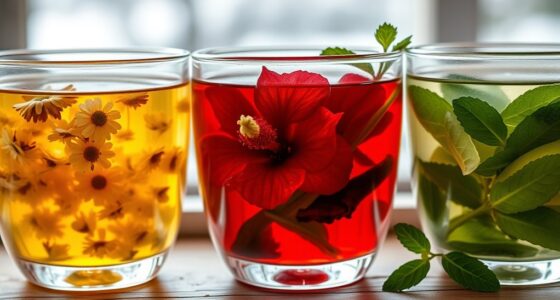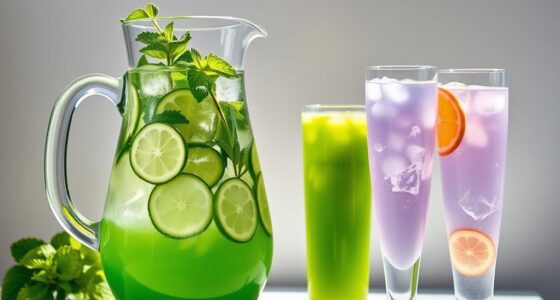If you prefer a tangy, complex flavor and don’t mind a longer fermentation process, kombucha might suit your lifestyle. It offers a broad range of probiotics but contains some caffeine from tea. If you want a milder, effervescent drink that’s quicker to make and caffeine-free, water kefir is a great choice. Both support gut health, but understanding their differences can help you pick the best fit—more details await to guide your decision.
Key Takeaways
- Choose kombucha for a complex, tangy flavor and diverse probiotics if you prefer longer fermentation and richer taste.
- Opt for water kefir if you want a milder, effervescent drink with a shorter fermentation time and caffeine-free options.
- Consider your dietary caffeine sensitivity—water kefir is caffeine-free, while kombucha contains some caffeine from tea.
- If you enjoy customizing flavors easily, water kefir’s simple preparation allows for quick flavoring post-fermentation.
- For probiotic diversity and health benefits, kombucha’s longer fermentation produces a broader range of beneficial microbes.

When choosing between kombucha and water kefir, understanding their differences can help you decide which probiotic-rich beverage best fits your taste and health goals. Both drinks are fermented, but their fermentation methods vary, impacting flavor, probiotic diversity, and preparation process. Kombucha is made by fermenting sweetened tea with a symbiotic culture of bacteria and yeast, commonly called SCOBY. This fermentation typically takes about a week, during which the SCOBY consumes the sugar and tea compounds, producing a tangy, slightly vinegary drink. Water kefir, on the other hand, involves fermenting sugar water with water kefir grains—gelatinous cultures containing a different combination of bacteria and yeast. This process tends to be quicker, often completed in 24 to 48 hours, resulting in a milder, effervescent beverage.
Kombucha ferments in a week, creating a tangy, vinegary flavor; water kefir ferments faster for a milder, effervescent drink.
The fermentation methods directly influence probiotic diversity, which is a key factor in choosing your beverage. Kombucha’s fermentation promotes a broad spectrum of probiotics due to the variety of microbes present in the SCOBY. This diversity can support gut health by introducing multiple beneficial bacteria strains. Water kefir grains tend to contain a slightly different mix of probiotics, often favoring certain strains of lactobacillus and yeasts, which also contribute positively to your digestive system. The specific microbes in each drink can vary based on the fermentation environment and ingredients used, but both offer valuable probiotic benefits. Additionally, the fermentation duration impacts the development of flavors and probiotic content in each beverage. A longer fermentation can enhance probiotic richness and deepen flavor complexity.
Furthermore, fermentation is a form of fermentation process that can unlock additional nutrients and bioactive compounds, making these drinks even more beneficial. Taste is another important aspect shaped by their fermentation processes. Kombucha’s longer fermentation results in a complex, tangy flavor with subtle vinegar notes, which some people find more challenging at first. Water kefir’s shorter fermentation produces a lighter, sweeter, and more neutral taste that’s often more appealing if you prefer milder flavors. Additionally, because kombucha is brewed with tea, it carries some caffeine, whereas water kefir is caffeine-free, making it a better choice if you’re sensitive to caffeine or prefer a non-caffeinated beverage.
In terms of preparation, kombucha requires a bit more attention—maintaining the SCOBY, controlling fermentation time, and sometimes flavoring it after the primary fermentation. Water kefir is simpler to make at home, needing only sugar water and grains, which can be reused repeatedly. Both drinks can be customized with fruits, herbs, or spices, allowing you to tailor the flavor profile to your preferences. Being aware of the microbial composition can help you choose the beverage that aligns with your health needs and taste preferences.
Frequently Asked Questions
Can Both Drinks Be Safely Consumed During Pregnancy?
During pregnancy, you should prioritize pregnancy safety when consuming fermented drinks. Both kombucha and water kefir are generally safe if prepared properly, but they contain trace amounts of alcohol and live cultures that might pose risks. It’s best to consult your healthcare provider before including these fermented drinks in your diet, as they can advise on safe consumption levels and guarantee you and your baby stay healthy.
Which Drink Has a Stronger Probiotic Effect?
When it comes to probiotic potency, you’re really asking which drink packs a bigger punch. Water kefir often boasts higher microbial diversity, giving it an edge in supporting gut health. Kombucha, on the other hand, has a strong probiotic effect thanks to its fermentation process. But don’t judge a book by its cover—try both to see which one your gut prefers, as each offers unique benefits.
Are There Any Allergy Concerns With Kombucha or Water Kefir?
Allergy concerns with kombucha and water kefir are worth considering. Both drinks can trigger allergy symptoms if you’re sensitive to ingredients like tea, sugar, or added flavorings. They also impact your immune response, especially if your immune system is compromised. It’s best to start with small amounts to see how your body reacts, and consult a healthcare professional if you experience unusual allergy symptoms or reactions.
How Long Do Homemade Batches Typically Last?
You might wonder about fermentation storage and shelf life for homemade batches. Generally, once fermented and bottled, your kombucha or water kefir can last about 1 to 3 weeks in the fridge. Proper storage in airtight containers hinders fermentation, maintaining flavor and carbonation. Keep an eye on signs of over-fermentation, like excessive acidity or fizz, to ensure your homemade drinks stay fresh and safe to enjoy.
Are There Flavor Options for Commercial Versions?
Imagine savoring your favorite drink, only to discover endless flavor varieties waiting for you. Commercial options often surprise you with a wide range of flavor varieties, from fruity to spicy, enhancing your experience. These options cater to different taste preferences, making your choice more exciting. So, yes, commercial versions offer diverse flavor varieties, giving you the flexibility to enjoy your fermented beverage exactly how you like it.
Conclusion
Ultimately, choosing between kombucha and water kefir comes down to your personal taste and lifestyle. It’s funny how a simple sip can align so well with your health goals or even fit into your daily routine without much thought. Whether you prefer the tangy sparkle of kombucha or the bubbly lightness of water kefir, you’re just a brew away from adding a little extra health boost to your day. Sometimes, the best choices are the ones that feel surprisingly natural.









